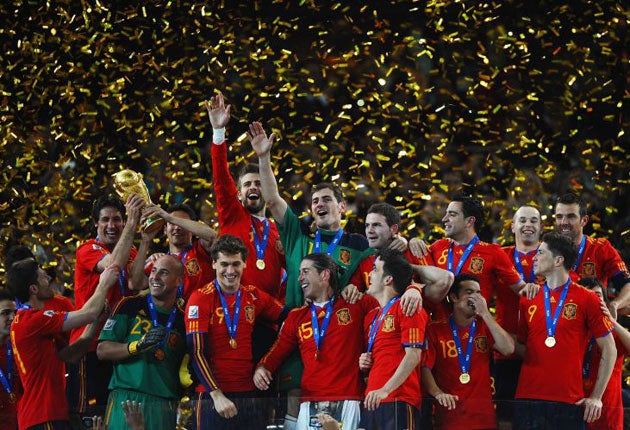Goals stood little chance against flooded midfield

Anyone who thought last night's match was going to be an end-to-end thriller has not been paying attention this past month. Caution has been the underlying theme of this World Cup. In that sense, the finals got the final it deserved, if not the excellent and joyous hosts. There have been some rivetting matches, but they have usually occurred when one team has been chasing a goal, either because they needed to win the match, or because their opponents had scored early.
This applied to most games involving these protagonists too. That the Dutch have not been playing "total football" has been much debated. They have fielded a trio of flair players in Arjen Robben, Wesley Sneijder and Robin van Persie, but the latter is usually isolated and the rest are toilers.
Spain, meanwhile, may have passed the ball prettily among themselves but their goal threat has been very limited. Seven goals in six matches leading into the final, one of them an own goal, made that very clear.
Thus we got exactly what should have been expected: Xavi, Andres Iniesta and company rotating possession in front of a wall of orange defenders. Overrun in the opening minutes, in part due to their nervous inability to keep possession, the Dutch swiftly withdrew everyone but Van Persie, leaving five across the midfield, holding a line 15 yards inside their own half, and a back four pushed up 10 yards outside the penalty area. Space was at such a premium and even the likes of Xavi found it impossible to find a yard to work in, or a way through. It was Internazionale against Barcelona all over again.
If only Sergio Ramos's third-minute header had gone in. Because what this game desperately needed was an early Spanish goal. That would have forced the Dutch to come out and play.
Instead, set- pieces became the most likely source of goals, but the Spanish are not a big side, with only Ramos, Carles Puyol and Gerard Pique likely to win a header. And none of them, despite Puyol's semi-final winner, are exactly Miroslav Klose in the air. Despite the number of free-kicks the Dutch conceded, the European champions looked even less likely to score with a direct shot.
Thus, after an hour's stalemate, Vicente del Bosque decided to add Jesus Navas to the mix, a flying winger, one who might get around the Dutch where the Spanish could not go through them. The move almost paid quick dividends but John Heitinga just managed to redeem himself after letting Navas's cross reach David Villa.
The Dutch, however, should have been ahead by then. The special ingredient in their dour mix of kick and cover was Robben. As in previous matches, the moment came when Sneijder took possession in midfield, spotted Robben on his radar, and released him over the top. Unlike against Slovakia, Robben did not score, neither then nor later.
Those reprieves did not stop Spain playing their game. Not much does. Remember the Champions League tie at Stamford Bridge, when Iniesta scored in the dying seconds? They had passed the ball then. As the clock wore on, Dutch legs inevitably wore out. As gaps began to appear, Del Bosque replaced Xabi Alonso with Cesc Fabregas to exploit them. With the Dutch belatedly reduced to 10 men after Heitinga's departure, more holes appeared. Iniesta found one of them, and Fabregas found him. No one in Spain will care about the 115 minutes that went before, and no one anywhere else is likely to remember them.
Subscribe to Independent Premium to bookmark this article
Want to bookmark your favourite articles and stories to read or reference later? Start your Independent Premium subscription today.

Join our commenting forum
Join thought-provoking conversations, follow other Independent readers and see their replies